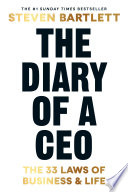

In 'The Diary of a CEO', the author emphasizes the critical role of authenticity in leadership and personal branding. Authenticity fosters trust and loyalty among employees, clients, and stakeholders. The author shares personal anecdotes that illustrate how being true to oneself can lead to more meaningful connections and a more robust organizational culture. Authentic leaders are more likely to inspire their teams and create an environment where innovation thrives. The book discusses practical strategies to cultivate authenticity, such as self-reflection, vulnerability, and open communication. By embracing authenticity, leaders can navigate challenges more effectively and create a lasting impact.
Continue readingResilience is a recurring theme in the book, with the author detailing the inevitable setbacks and failures that accompany any entrepreneurial journey. The narrative highlights how resilience can be cultivated through a growth mindset and the willingness to learn from experiences. The author shares stories of notable entrepreneurs who faced significant challenges but persevered, illustrating that resilience is not just about bouncing back but also about growing stronger through adversity. Practical tips for developing resilience include setting realistic goals, maintaining a supportive network, and practicing self-care. The book argues that resilience is essential for long-term success and personal fulfillment.
Continue readingInnovation is presented as a cornerstone of sustainable business growth in 'The Diary of a CEO'. The author discusses the importance of fostering a culture of innovation within organizations, encouraging teams to think creatively and challenge the status quo. The book outlines various approaches to drive innovation, such as promoting cross-functional collaboration, investing in research and development, and embracing failure as a learning opportunity. The author also emphasizes the need for leaders to stay ahead of industry trends and be willing to adapt their strategies accordingly. By prioritizing innovation, companies can differentiate themselves in competitive markets and better meet the evolving needs of their customers.
Continue readingA strong company culture is vital for attracting and retaining top talent, as discussed in the book. The author shares insights on how to create an inclusive and engaging workplace where employees feel valued and motivated. Key elements of a strong culture include clear values, open communication, recognition of achievements, and opportunities for professional development. The book also highlights the role of leadership in shaping culture, with leaders needing to model the behaviors they wish to see in their teams. By investing in company culture, organizations can enhance employee satisfaction, improve performance, and drive business success.
Continue readingNetworking is portrayed as a vital skill for entrepreneurs and professionals alike. The author emphasizes that building meaningful relationships can open doors to new opportunities, partnerships, and resources. The book provides practical advice on how to network effectively, including attending industry events, leveraging social media, and nurturing existing connections. The author also stresses the importance of giving back to one's network, fostering a spirit of collaboration and support. By investing time in networking, individuals can expand their horizons and create a robust support system that can help them navigate their career paths.
Continue readingUnderstanding financial principles is crucial for entrepreneurs, as highlighted in the book. The author discusses the importance of financial literacy in making informed business decisions, managing cash flow, and securing funding. The book outlines essential financial concepts, such as budgeting, forecasting, and investment strategies, providing readers with a foundational understanding of managing finances effectively. The author also shares personal experiences related to financial challenges and successes, reinforcing the idea that financial knowledge is a powerful tool for achieving long-term goals. By prioritizing financial literacy, entrepreneurs can better position themselves for growth and sustainability.
Continue readingThe book explores the evolving landscape of work and the implications for leaders and organizations. The author discusses trends such as remote work, digital transformation, and the gig economy, emphasizing the need for adaptability in the face of change. The narrative encourages leaders to embrace new technologies and rethink traditional work models to attract and retain talent. The author also addresses the importance of employee well-being and mental health in the modern workplace, advocating for a holistic approach to leadership that prioritizes people. By understanding the future of work, leaders can create more agile and resilient organizations.
Continue readingThe reading time for The Diary of a CEO depends on the reader's pace. However, this concise book summary covers the 7 key ideas from The Diary of a CEO, allowing you to quickly understand the main concepts, insights, and practical applications in around 23 min.
The Diary of a CEO is definitely worth reading. The book covers essential topics including The Importance of Authenticity, The Power of Resilience, The Role of Innovation in Business, providing practical insights and actionable advice. Whether you read the full book or our concise summary, The Diary of a CEO delivers valuable knowledge that can help you improve your understanding and apply these concepts in your personal or professional life.
The Diary of a CEO was written by Steven Bartlett.
If you enjoyed The Diary of a CEO by Steven Bartlett and want to explore similar topics or deepen your understanding, we highly recommend these related book summaries:
These books cover related themes, complementary concepts, and will help you build upon the knowledge gained from The Diary of a CEO. Each of these summaries provides concise insights that can further enhance your understanding and practical application of the ideas presented in The Diary of a CEO.